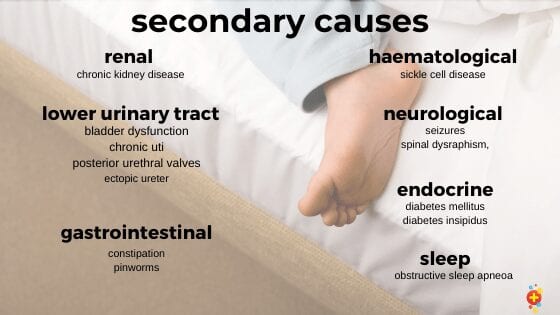Contents
General description of the disease
This is a phenomenon characterized by involuntary urination during sleep.
Types and causes of enuresis
Basic classification:
- 1 Primary – a child who is more than 5 years old suffers from urinary incontinence, if he has not developed a conditioned reflex at all, or if he has not had a dry period for more than a quarter (that is, the child woke up dry from birth for less than 3 months in a row). This group also includes adults in whom enuresis is observed from birth.
- 2 Secondary (psychogenic) – the child began to suffer from urinary incontinence, but before that he had stable control over the emptying of his bladder (the period of stability is considered to be a period from a quarter to six months). This means that the child has developed an emptying reflex, but has been lost or weakened due to possible infectious diseases or severe mental trauma (for example, the loss of parents). All of the above applies to adults as well.
The rest of the classifications of enuresis, depending on
The presence of complications:
Uncomplicated – after the analyzes and studies carried out, no deviations were found.
Complicated – urinary incontinence has arisen due to various infections of the pathways that excrete urine, some anatomical changes in the urinary tract are revealed, or disorders in neurology are found (an example is the presence of myelodysplasia or small cerebral dysfunction).
Currents:
Lung – within 7 days only one or two incontinence cases were recorded.
Secondary – In a 7-day period of time, there are 5 uncontrolled urination.
Heavy – the child has one or even two episodes of incontinence per night (most often observed in children who have inherited the disease).
Type:
Day – enuresis, which occurs only during the daytime (the most rare type, occurs in only 5% of children with enuresis).
Night – involuntary urination occurs only at night (the most common type, from which 85% of all patients with enuresis suffer).
Mixed – urinary incontinence can occur both during the day and at night (of the total number of patients, it occurs in 10%).
The reasons:
Neurotic – belongs to the group of secondary enuresis and arises from a strong psychological shock, stress experienced, fright or feelings of fear.
Neurosis-like: the cause of primary enuresis is the delay in the maturation of the central nervous and genitourinary systems and the mechanisms of urine emission, the disturbed rhythm of the release of antidiuretic hormone; secondary, however, may occur due to trauma, intoxication or diseases, due to which the mechanism of regulation of urinary excretion is disrupted.
Also, the causes of bedwetting can be:
- the presence of endocrine diseases, epilepsy;
- taking medicines like “Sonapax and Valproate”.
Important!
The terms urinary incontinence and non-continence should not be confused. Failure to hold urine means that a person wants but cannot consciously hold and control the process of urination, due to damaged pelvic floor muscles and nerve endings that are responsible for regulating them. No urinary retention is in any way related to sleep.
It should be noted that enuresis occurs much more frequently in women. The cause of enuresis in women can be:
- 1 frequent childbirth;
- 2 constant lifting of heavy things;
- 3 undergone operations on the pelvic organs;
- 4 hormonal disbalance;
- 5 muscles are constantly in tension.
Useful foods for enuresis
There are no special dietary guidelines for enuresis. Food should be enriched with vitamins (especially C and ascorbic acid – they oxidize urine), minerals and nutrients. From drinks it is better to give water without gas, juices, dried fruit compotes (they are not diuretic). Dinner should be as dry as possible (for example, dry crumbly porridge – buckwheat, rice, millet, you can add butter, a boiled egg, bread with jam or cheese and a glass of weakly brewed tea). Dinner should be about 3 hours before bedtime. The optimal number of meals a day is 4 or 5 times.
Traditional medicine for enuresis:
- Decoctions of St. John’s wort, centaury, plantain, yarrow, motherwort, lingonberry leaves, sage, elecampane roots, blueberries and blackberries, crushed rose hips, dill seeds work well on the genitourinary system.
- An hour before going to bed, the child needs to go pee. So that at night he is not afraid of the dark, it is better to leave a small night light on and put the pot near the bed.
- It is better not to wake the child up in the middle of the night, so as not to spoil the central nervous system (the child will think that he will be awakened and most likely will oversleep the “important moment”). If, nevertheless, you decide to wake up the child, then you should wake him up completely so that he does not do “his business” sleepy (in this case, the disease will only worsen).
- Stimulus. It is necessary to lure the child. For example, let him start keeping a calendar of nights: if the night is dry, then let him draw the sun, wet – a cloud. Say that after 5-10 nights without uncontrolled urination, a surprise gift will follow.
- It is imperative to monitor the temperature in the room (in a cool room, it is likely that the child is described more).
Dangerous and harmful foods for enuresis
- a large amount of liquid (it is better not to drink at all 2 hours before bedtime);
- milk porridge, soups before bedtime;
- spices and spicy dishes;
- diuretic products (especially coffee, strong tea, kefir, chocolate, cocoa, carbonated and artificial drinks, watermelon, apples, cucumbers, lingonberry and cranberry fruit drinks).
Attention!
The administration is not responsible for any attempt to use the information provided, and does not guarantee that it will not harm you personally. The materials cannot be used to prescribe treatment and make a diagnosis. Always consult your specialist doctor!










